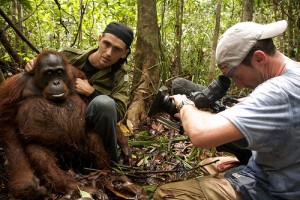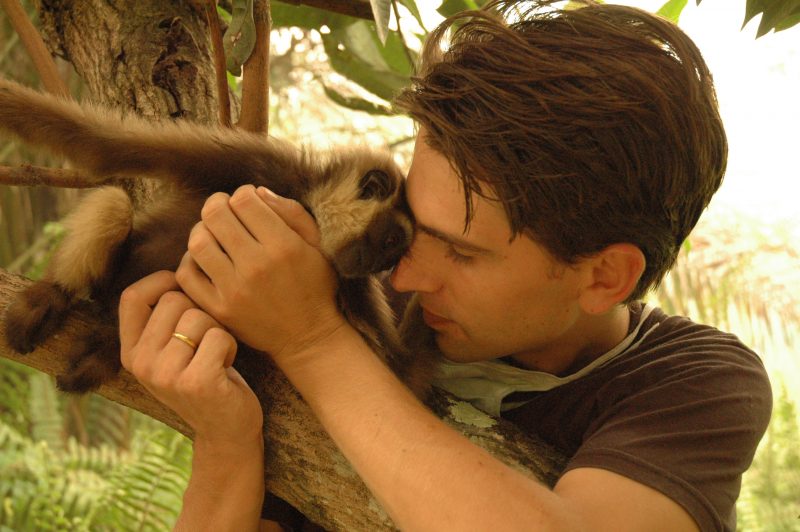Chanee Kalaweit is a former French national, who in 2012 gained his Indonesian citizenship. Since the tender age of 12, Chanee has dedicated his life to the gibbon, apes living in Asia’s tropical and subtropical rainforests, including in Sumatra, Borneo and Java. Chanee rose to fame when he created a video that went viral, addressing the president regarding the haze crisis in Sumatra and Kalimantan. We caught up with him in Palangkaraya to find out the full story of his NGO Kalaweit; the biggest gibbon protection programme in the world.
When did you first come to Indonesia?
I left for Indonesia at the age of 18 in May 1998. The first thing I did was go to Borneo for three months to survey and see how bad the deforestation situation was. After three months I realized that a project like mine was needed and the first gibbon programme was born in September 1999.
As a kid in France I always loved primates, and the first time I met a gibbon in a zoo, it looked into my eyes so sadly. It was alone and I wanted to help and understand what was wrong. I learned that gibbons are monogamists, which makes it difficult for zoos to carry out successful mating programmes.
I asked the director of the zoo if I could come for free every Wednesday when I wasn’t at school. I did this for five years, from the age of 12. Eventually I started helping other zoos in France with their gibbon programmes.
How did you raise funds to come and set up your charity Kalaweit in Indonesia?
When I was 16 I published a book on gibbon behaviours. Journalists were interested because I was a 16-year-old who wasn’t outside playing soccer with friends. Actress Muriel Robin called me and said, “You want to go to Asia to help gibbons, I want to help you.” She funded me, and to this day she still watches the development of the organization and we are good friends.
Tell us about the work your charity does in protecting the gibbon and other animals in threat.
Kalaweit covers all of Sumatra, Borneo and Mentawai. We have two sanctuaries and a reserve.
We help by:
1) Giving a second chance to animals detained as pets or who are victims of deforestation by rehabilitating and returning them to the wild. 285 gibbons are under our care right now. 2) Securing forestland for conservation – I buy land where biodiversity is very high to make micro-reserves. In Sumatra we have 281 hectares, and in Borneo we have 20 hectares, which we hope will reach 100 hectares by the end of the year. 3) Involving locals in our fight through our radio station and TV programmes.
We also aid the government in protecting reserves. I am a paramotor pilot and I fly over every location once a month – I also do this to illustrate deforestation.
How much does the forestland you buy for conservation purposes cost?
In Sumatra it costs around Rp.15 million per hectare and in Borneo around Rp.25 million per hectare.
Do any palm oil concession owners get involved with conservation?
You see big companies who own thousands of hectares of forestland trying to do good to protect their image. Some companies will actually keep 10 percent of their concession as a sanctuary for animals.
In Sumatra I released siamang gibbons into a 2,000-hectare reserve owned by a private guy in a palm oil concession. It will be very difficult for him to change his mind now, as I’ve released animals into his forest which we accompanied with a big publicity campaign.
 The video you shot during the haze crisis went viral and really helped to raise awareness about this serious issue. Can you tell us what inspired you to make this video?
The video you shot during the haze crisis went viral and really helped to raise awareness about this serious issue. Can you tell us what inspired you to make this video?
When you fight this industry you have to protect yourself by making yourself well-known. I was very upset as a father to see my kids very sick and people dying because of smoke and palm oil.
I never imagined the video would go viral. When I uploaded it, the next morning there were 35,000 views. The Minister of Forestry asked me to come to Jakarta, but it just felt like they didn’t want me to cause any more ‘problems’. I really feel like nothing will change. This year, if we have a dry season, the same thing will happen.
What is the biggest challenge you face?
The lack of law enforcement in Indonesia. There are also still many high profile people in Indonesia who work for the government yet still keep protected animals in their homes – because they can and they don’t care. When law enforcement doesn’t work, you can’t expect much.
You state that the forests of Indonesia will disappear by 2030. Do you see any progression from the government towards stopping this?
It’s the biggest frustration because you feel just like a witness. After logging takes place, forests still remain, although in bad shape. My goal was to secure forestland after logging to protect the animals left behind, but since 2000 every single piece of land is being converted to palm oil plantations.
The government thinks that companies who own concessions for palm oil don’t operate outside of their boundaries, but in fact there is a lot of land being used for palm oil plantations outside of these concessions, which are under private ownership, and are destroying forest, even on peat land. There is a moratorium, but this only applies to companies and not individuals.
With all the frustrations and difficulties you face, are you still optimistic that you can make a difference?
Every hectare of land and every animal saved is a victory.
I learned that the goal is less important than the process. If I know that the end of the world will be next week, I will still save gibbons because it’s what I do. I don’t want to be pessimistic because I will lose the energy to keep fighting. We just have to act.
Are you seeing a positive response from the listeners of your radio station Kalaweit Radio in Palangkaraya?
Our station started in 2003 and targets young people by airing good music and funny shows. Every hour we air messages about gibbons and the forest. 70 percent of the rescued animals we see are actually from our listeners. At schools, kids will tell their friends off for owning pet gibbons and in the end they hand them over to us for rehabilitation.
Tell us about your TV show Kalaweit Wildlife Rescue.
The second season on Metro TV starts in March. The cameras follow my team saving animals all over Sumatra, Borneo and Mentawai. It’s the first TV show on conservation shot in Indonesia. Having millions of people watching is the best way to help. On primetime French television I’m also in the middle of shooting a documentary series where we travel the world trying to save different endangered animals.
How can readers help?
The first thing is to say no to palm oil.
We have a lot of forest to save, but we need the money to buy the land. We require €550,000 a year to survive, which does not include money to buy forestland. We are 100 percent funded by donations.
Thank you, Chanee. Visit www.kalaweit.org for more information on how you can help.





